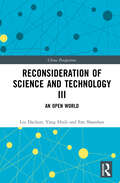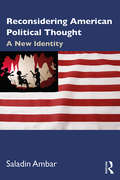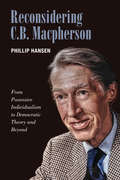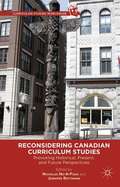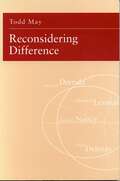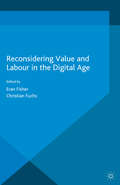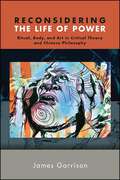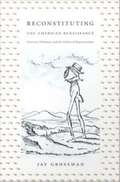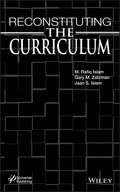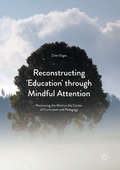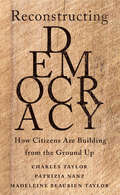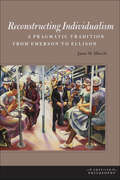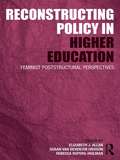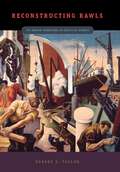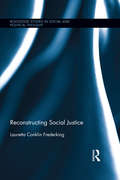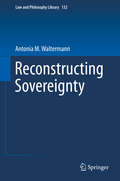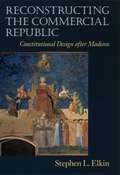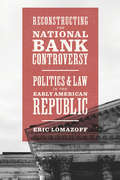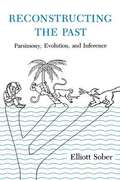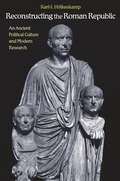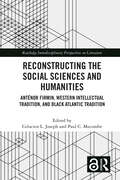- Table View
- List View
Reconsideration of Science and Technology III: An Open World (China Perspectives)
by Liu Dachun Yang Huili Fan ShanshanDrawing on debates from traditional and postmodern thoughts on science and technology, the title builds a new theoretical framework to reconsider science and technology, integrating the opposing viewpoints that either justify science or negate it. As the third volume of a three-volume set that proposes to reconsider science and technology and explores how the philosophy of science and technology responds to an ever-changing world, this final volume seeks to restore the cultural implications of science. Across the six chapters, the authors probe the prospect of a pluralistic scientific culture, including discussions of diversified value choices, the tension between reason and unreason, other binary characteristics of scientific knowledge, including objectivity and uniqueness, universality and locality, as well as the loss, awakening and reconstruction of scientific culture. The authors call for a transformation of scientific culture from a dominant culture to an affirmative one and envision a free and open world of science and technology. The volume will appeal to scholars and students interested in the philosophy of science and technology, the ideology of scientism and anti-scientism, modernism and postmodernism, Marxist philosophy and topics related to scientific culture.
Reconsidering American Political Thought: A New Identity
by Saladin AmbarFilling in the missing spaces left by traditional textbooks on American political thought, Reconsidering American Political Thought uses race, gender, and ethnicity as a lens through which to engage ongoing debates on American values and intellectual traditions. Weaving document-based texts analysis with short excerpts from classics in American literature, this book presents a re-examination of the political and intellectual debates of consequence throughout American history. Purposely beginning the story in 1619, Saladin Ambar reassesses the religious, political, and social histories of the colonial period in American history. Thereafter, Ambar moves through the story of America, with each chapter focusing on a different era in American history up to the present day. Ambar threads together analysis of periods including Thomas Jefferson’s aspiration to create an "Empire of Liberty," the ethnic, racial, and gender-based discourse instrumental in creating a "Yankee" industrial state between 1877 and 1932, and the intellectual, cultural, and social forces that led to the political rise of Ronald Reagan and Barack Obama in recent decades. In closing, Ambar assesses the prospects for a new, more invigorated political thought and discourse to reshape and redirect national energies and identity in the Trump presidency. Reconsidering American Political Thought presents a broad and subjective view about critical arguments in American political thought, giving future generations of students and lecturers alike an inclusive understanding of how to teach, research, study, and think about American political thought.
Reconsidering C.B. MacPherson
by Phillip HansenC.B. Macpherson occupies an ambiguous place in contemporary political thought. Though his work is well known, it remains on the margins of current democratic theory. That marginalization, Phillip Hansen argues, comes from our failure to appreciate the underlying philosophical dimension of Macpherson's work.Identifying and exploring Macpherson's systematic critique of the liberal claim that the individual is the "proprietor of his own person or capacities, owing nothing to society for them," Reconsidering C.B. Macpherson highlights his affinities to Herbert Marcuse, Max Horkheimer, and the Frankfurt School.This stimulating reappraisal illustrates the importance of Macpherson's classic books, including The Political Theory of Possessive Individualism and Democratic Theory, and demonstrates how much his work has to offer to the future of political and social thought.
Reconsidering Canadian Curriculum Studies
by Nicholas Ng-A-Fook Jennifer RottmannComprised of chapters written by established Canadian curriculum scholars as well as junior scholars and graduate students, this collection of essays provoke readers to imagine the different ways in which educational researchers can engage the narrative inquiry within the broader field of curriculum studies.
Reconsidering Difference: Nancy, Derrida, Levinas, Deleuze (G - Reference, Information and Interdisciplinary Subjects)
by Todd MayFrench philosophy since World War II has been preoccupied with the issue of difference. Specifically, it has wanted to promote or to leave room for ways of living and of being that differ from those usually seen in contemporary Western society. Given the experience of the Holocaust, the motivation for such a preoccupation is not difficult to see. For some thinkers, especially Jean-Luc Nancy, Jacques Derrida, Emmanuel Levinas, and Gilles Deleuze, this preoccupation has led to a mode of philosophizing that privileges difference as a philosophical category. Nancy privileges difference as a mode of conceiving community, Derrida as a mode of conceiving linguistic meaning, Levinas as a mode of conceiving ethics, and Deleuze as a mode of conceiving ontology.Reconsidering Difference has a twofold task, the primary one critical and the secondary one reconstructive. The critical task is to show that these various privilegings are philosophical failures. They wind up, for reasons unique to each position, endorsing positions that are either incoherent or implausible. Todd May considers the incoherencies of each position and offers an alternative approach. His reconstructive task, which he calls "contingent holism," takes the phenomena under investigation—community, language, ethics, and ontology—and sketches a way of reconceiving them that preserves the motivations of the rejected positions without falling into the problems that beset them.
Reconsidering Historical Epistemology: French and Anglophone Styles in History and Philosophy of Science (Studies in History and Philosophy of Science #61)
by Matteo VagelliThis book explores the key conceptual stakes underpinning historical epistemology. The strong Anglophone interest in historical epistemology, since at least the 1990s, is typically attributed to its simultaneously philosophical and historical synthetic approach to the study of science. Yet this account, considered by critics to be an unreflective assumption, has prevented historical epistemology from developing a clear understanding and definition, especially regarding how precisely historical and philosophical reflections on the sciences should be combined. Thus, this book uniquely analyses how the problems and tensions inherent to the “contemporary” phase of historical epistemology can be clarified by reference to the “classical” French phase. The archaeological method of Michel Foucault, which draws on and transforms fundamental insights by Gaston Bachelard and Georges Canguilhem, is used to exert an enduring influence on the field—especially through the work of Ian Hacking and his philosophical cum historical analyses of “styles of scientific reasoning”. Though this book is of great value to academic specialists and graduate students, the fact it addresses questions broad in scope ensures it is also relevant to a range of scholars in many disciplines and will provoke discussion among those interested in foundational issues in history and philosophy of science.
Reconsidering Value and Labour in the Digital Age (Dynamics of Virtual Work)
by Christian Fuchs Eran FisherThis volume explores current interventions into the digital labour theory of value, proposing theoretical and empirical work that contributes to our understanding of Marx's labour theory of value, proposes how labour and value are transformed under conditions of virtuality, and employ the theory in order to shed light on specific practices.
Reconsidering the Life of Power: Ritual, Body, and Art in Critical Theory and Chinese Philosophy (SUNY series in Chinese Philosophy and Culture)
by James GarrisonReconsidering the Life of Power examines Chinese perspectives on bodily self-cultivation and explores how these can be resources for working past the ritual scripts of everyday life. In recent decades, European and American thinkers like Michel Foucault and Judith Butler have called attention to the way that people live out ritual scripts in order to be recognized by other people such that they might survive. Philosophers in China, however, have a long history of considering ritual not just in terms of confining power structures but also in terms of empowering artistic self-cultivation. Out of this convergence, a response to Butler's The Psychic Life of Power becomes possible, along with fascinating implications for improving real-world experience.James Garrison looks at art and aesthetics as a way of responding positively to the vicissitudes of everyday life. This means reframing ritual practice in domains like meditation, yoga, tai chi chuan, dance, calisthenics, fashion, and beyond as a kind of work that delves into and unearths society's long-accruing unconscious habits in a way that makes conscious one's everyday speech, comportment, countenance, and presence. The everyday body thus becomes an artwork, speaking in novel ways to the everyday self by revealing an alternative to the programmed ritual scripts through which most of us tend to survive. Reconsidering the Life of Power offers a compelling contemporary intercultural perspective on body, art, self, and society that bridges theory and practice by providing an actionable yet deeply philosophical approach to enhancing life.
Reconstituting the American Renaissance: Emerson, Whitman, and the Politics of Representation
by Jay GrossmanChallenging the standard periodization of American literary history, Reconstituting the American Renaissance reinterprets the works of Ralph Waldo Emerson and Walt Whitman and the relationship of these two authors to each other. Jay Grossman argues that issues of political representation--involving vexed questions of who shall speak and for whom--lie at the heart of American political and literary discourse from the revolutionary era through the Civil War. By taking the mid-nineteenth-century period, traditionally understood as marking the advent of literary writing in the United States, and restoring to it the ways in which Emerson and Whitman engaged with eighteenth-century controversies, rhetorics, and languages about political representation, Grossman departs significantly from arguments that have traditionally separated American writing in the eighteenth and nineteenth centuries. Reconstituting the American Renaissance describes how Emerson and Whitman came into the period of their greatest productivity with different conceptions of the functions and political efficacy of the word in the world. It challenges Emerson's position as Whitman's necessary precursor and offers a cultural history that emphasizes the two writers' differences in social class, cultural experience, and political perspective. In their writings between 1830 and 1855, the book finds contrasting conceptions of the relations between the "representative man" and the constituencies to whom, and for whom, he speaks. Reconstituting the American Renaissance opens up the canonical relationship between Emerson and Whitman and multiplies the historical and discursive contexts for understanding their published and unpublished works.
Reconstituting the Curriculum
by Gary M. Zatzman Jaan S. Islam M. R. IslamThis inspiring work presents a truly knowledge-based approach to education as an alternative to the current curriculum that is based on consolidating pre-conceived ideas. It demonstrates the advantages of the new curriculum, both in terms of acquiring knowledge and preventing current problems such as technological disasters, global injustice, and environmental destruction. It also shows how it can eliminate plagiarism, low retention in classrooms, non-representative grading, and other common problems. Examples are given from various disciplines, ranging from science and engineering to philosophy and law.
Reconstructing 'Education' through Mindful Attention
by Oren ErgasThis book reconstructs the idea and practice of education. Rather than conceiving of education as a process we undergo in which our minds are shaped by a social vision, Oren Ergas turns this notion of education on its head, arguing instead that we ourselves construct education. The multitude of problems with formal education and schooling, such as violence, inequality, and low achievements, are then seen as reflections of problems of the mind, meaning that close study of the mind is necessary if these problems are to be successfully tackled. Through philosophy, neuroscience and psychology, this book proposes a new perspective on 'educational' theory, practice and research. It will be of great interest to students and teachers, scholars of education, and educational policy-makers.
Reconstructing Democracy: How Citizens Are Building from the Ground Up
by Charles Taylor Patrizia Nanz Madeleine Beaubien Taylor“An urgent manifesto for the reconstruction of democratic belonging in our troubled times.” —Davide Panagia Across the world, democracies are suffering from a disconnect between the people and political elites. In communities where jobs and industry are scarce, many feel the government is incapable of understanding their needs or addressing their problems. The resulting frustration has fueled the success of destabilizing demagogues. To reverse this pattern and restore responsible government, we need to reinvigorate democracy at the local level. But what does that mean? Drawing on examples of successful community building in cities large and small, from a shrinking village in rural Austria to a neglected section of San Diego, Reconstructing Democracy makes a powerful case for re-engaging citizens. It highlights innovative grassroots projects and shows how local activists can form alliances and discover their own power to solve problems.
Reconstructing Individualism: A Pragmatic Tradition from Emerson to Ellison (American Philosophy)
by James M. AlbrechtAmerica has a love–hate relationship with individualism. In Reconstructing Individualism, James Albrecht argues that our conceptions of individualism have remained trapped within the assumptions of classic liberalism. He traces an alternative genealogy of individualist ethics in four major American thinkers—Ralph Waldo Emerson, William James, John Dewey, and Ralph Ellison.These writers’ shared commitments to pluralism (metaphysical and cultural), experimentalism, and a melioristic stance toward value and reform led them to describe the self as inherently relational. Accordingly, they articulate models of selfhood that are socially engaged and ethically responsible, and they argue that a reconceived—or, in Dewey’s term, “reconstructed”—individualism is not merely compatible with but necessary to democratic community. Conceiving selfhood and community as interrelated processes, they call for an ongoing reform of social conditions so as to educate and liberate individuality, and, conversely, they affirm the essential role individuality plays in vitalizing communal efforts at reform.
Reconstructing Policy in Higher Education: Feminist Poststructural Perspectives
by Elizabeth J. Allan Susan Iverson Rebecca Ropers-HuilmanReconstructing Policy in Higher Education highlights the work of accomplished and award-winning scholars and provides concrete examples of how feminist poststructuralism effectively informs research methods and can serve as a vital tool for policy makers, analysts, and practitioners. The research examines a range of topics of interest to scholars and professionals including: purposes of Higher Education, administrative leadership, athletics, diversity, student activism, social class, the history of women in postsecondary institutions, and quality and science in the globalized university. Students enrolled in Higher Education and Educational Policy programs will find this book offers them tools for thinking differently about policy analysis and educational practice. Higher Education faculty, managers, deans, presidents, and policy makers will find this book contributes significantly to their own policy analysis, practice, and discourse. Elizabeth J. Allan is an Associate Professor of Higher Education at the University of Maine where she is also an affiliated faculty member with the Women’s Studies program. Susan V. Iverson is an Assistant Professor of Higher Education Administration & Student Personnel at Kent State University where she is also an affiliated faculty member with the Women’s Studies Program. Rebecca Ropers-Huilman is a Professor of Higher Education at the University of Minnesota.
Reconstructing Rawls: The Kantian Foundations of Justice as Fairness
by Robert S. TaylorReconstructing Rawls has one overarching goal: to reclaim Rawls for the Enlightenment—more specifically, the Prussian Enlightenment. Rawls’s so-called political turn in the 1980s, motivated by a newfound interest in pluralism and the accommodation of difference, has been unhealthy for autonomy-based liberalism and has led liberalism more broadly toward cultural relativism, be it in the guise of liberal multiculturalism or critiques of cosmopolitan distributive-justice theories. Robert Taylor believes that it is time to redeem A Theory of Justice’s implicit promise of a universalistic, comprehensive Kantian liberalism. Reconstructing Rawls on Kantian foundations leads to some unorthodox conclusions about justice as fairness, to be sure: for example, it yields a more civic-humanist reading of the priority of political liberty, a more Marxist reading of the priority of fair equality of opportunity, and a more ascetic or antimaterialist reading of the difference principle. It nonetheless leaves us with a theory that is still recognizably Rawlsian and reveals a previously untraveled road out of Theory—a road very different from the one Rawls himself ultimately followed.
Reconstructing Research Integrity: Beyond Denial
by Barbara RedmanThis book exposes significant threats to research integrity and identifies policies and practices that can reverse these trends. It is focused on human research and US policy. Recent assessments have shown inadequacies in institutions, policies, and practices that seriously compromise ethics. The presumed self-regulatory nature of the scientific endeavor has been exposed to have allowed unabated areas of poor-quality science, an incomplete and inaccessible scientific record, conflicts of interest, differing notions of accountability, virtually no evidence base to direct research integrity policy, and a growing sense of alienation, moral injury and even revolt among scientists. Reconstructing Research Integrity aims to capture ways of vigorously moving toward scientific and ethical rigor, including self-correction and emerging or already-successful initiatives. The book begins with analysis of the full system of institutions, policies, and practices involved in production, dissemination, and application of research, including an examination of the blind spots in research ethics ideology, policy, and practice. The book then identifies policies and practices that can reverse harmful ethical trends, such as strengthening Responsible Conduct of Research (RCR) training and improving self-regulation in the scientific community. Finally, the book discusses the constant evolution of research ethics and integrity, which is illustrated by emerging research fields like gene editing and data science. This book will be of interest to all research administrators in academic, commercial and government positions; to policy advisors at the National Science Foundation and at the National Academies of Science, Engineering, and Medicine; to graduate students in research ethics; to advanced bioethics education programs across the globe; and to researchers and consultants in ELSI (ethical, legal, and social implications) programs.
Reconstructing Social Justice: Reconstructing Social Justice (Routledge Studies in Social and Political Thought)
by Lauretta Conklin FrederkingThe rhetoric of social justice is commonplace but increasingly it means little more than a tag line or a punctuation point. Reconstructing Social Justice presents a new framework for social justice that will change the way people think about social justice and change the way people implement social justice. This book carves out an intellectual and practical space for social justice that is distinct from political, legal, and economic spheres. While emphasizing a distinct domain for social justice, the author then makes sense of its healing role in terms of the polity, economy, technology, and religion. Drawing from a rich supply of classroom experiences, her research on mosque controversies after September 11, 2001, and then the global examples of truth and reconciliation commissions, Frederking invites the reader to think about the relevance of social justice from the micro to the macro level. Rather than a set of policy outcomes or ideological positions, social justice is a process of social accountability that demands honest and transparent engagement. While disagreement is likely and controversy inevitable, this social justice process reaffirms our connectedness and moves us forward as a collective.
Reconstructing Sociology
by Douglas V. PorporaCritical realism is a philosophy of science that positions itself against the major alternative philosophies underlying contemporary sociology. This book offers a general critique of sociology, particularly sociology in the United States, from a critical realist perspective. It also acts as an introduction to critical realism for students and scholars of sociology. Written in a lively, accessible style, Douglas V. Porpora argues that sociology currently operates with deficient accounts of truth, culture, structure, agency, and causality that are all better served by a critical realist perspective. This approach argues against the alternative sociological perspectives, in particular the dominant positivism which privileges statistical techniques and experimental design over ethnographic and historical approaches. However, the book also compares critical realism favourably with a range of other approaches, including poststructuralism, pragmatism, interpretivism, practice theory, and relational sociology. Numerous sociological examples are included, and each chapter addresses well-known and current work in sociology.
Reconstructing Sovereignty (Law and Philosophy Library #132)
by Antonia M. WaltermannThe notion of sovereignty plays an important part in various areas of law, such as constitutional law and international public law. Though the concept of sovereignty as applied in constitutional law differs from that used in international public law, there is no true consensus on the meaning of “sovereignty” within these respective fields, either.Is sovereignty about factual power, or only about legal equality? Do only democracies have sovereignty, because they have legitimacy, or is there no (necessary) connection between democracy, legitimacy and sovereignty? Has the European Union encroached upon the sovereignty of the Member States, or is transferring competences to the European Union an expression and exercise of the very sovereignty some claim is under attack? Is it about states, or is it about peoples having a right to self-determination, and if the latter, does this represent popular sovereignty or something else? In order to answer these and related questions, we need a clear grasp of what “sovereignty” means. This book provides an analytical and conceptual framework for “sovereignty” in the context of law.The book does not seek to describe how the term “sovereignty” is used in the different contexts and discourses in which it is employed, but rather distinguishes between two possible meanings of sovereignty that allow the reader to use the term with specificity and clarity. In this way, this book hopes to offer valuable analytical tools for politicians, constitutional and international lawyers (both practitioners and academics) and legal theorists that help them be clear about what they mean when they speak of “sovereignty.”
Reconstructing the Commercial Republic: Constitutional Design after Madison
by Stephen L. ElkinJames Madison is the thinker most responsible for laying the groundwork of the American commercial republic. But he did not anticipate that the propertied class on which he relied would become extraordinarily politically powerful at the same time as its interests narrowed. This and other flaws, argues Stephen L. Elkin, have undermined the delicately balanced system he constructed. In Reconstructing the Commercial Republic, Elkin critiques the Madisonian system, revealing which of its aspects have withstood the test of time and which have not. The deficiencies Elkin points out provide the starting point for his own constitutional theory of the republic—a theory that, unlike Madison’s, lays out a substantive conception of the public interest that emphasizes the power of institutions to shape our political, economic, and civic lives. Elkin argues that his theory should guide us toward building a commercial republic that is rooted in a politics of the public interest and the self-interest of the middle class. He then recommends specific reforms to create this kind of republic, asserting that Americans today can still have the lives a commercial republic is intended to promote: lives with real opportunities for economic prosperity, republican political self-government, and individual liberty.
Reconstructing the National Bank Controversy: Politics and Law in the Early American Republic
by Eric LomazoffThe Bank of the United States sparked several rounds of intense debate over the meaning of the Constitution’s Necessary and Proper Clause, which authorizes the federal government to make laws that are “necessary” for exercising its other powers. Our standard account of the national bank controversy, however, is incomplete. The controversy was much more dynamic than a two-sided debate over a single constitutional provision and was shaped as much by politics as by law. With Reconstructing the National Bank Controversy, Eric Lomazoff offers a far more robust account of the constitutional politics of national banking between 1791 and 1832. During that time, three forces—changes within the Bank itself, growing tension over federal power within the Republican coalition, and the endurance of monetary turmoil beyond the War of 1812 —drove the development of our first major debate over the scope of federal power at least as much as the formal dimensions of the Constitution or the absence of a shared legal definition for the word “necessary.” These three forces—sometimes alone, sometimes in combination—repeatedly reshaped the terms on which the Bank’s constitutionality was contested. Lomazoff documents how these three dimensions of the polity changed over time and traces the manner in which they periodically led federal officials to adjust their claims about the Bank’s constitutionality. This includes the emergence of the Coinage Clause—which gives Congress power to “coin money, regulate the value thereof”—as a novel justification for the institution. He concludes the book by explaining why a more robust account of the national bank controversy can help us understand the constitutional basis for modern American monetary politics.
Reconstructing the Past: Parsimony, Evolution, and Inference
by Elliott SoberReconstructing the Past seeks to clarify and help resolve the vexing methodological issues that arise when biologists try to answer such questions as whether human beings are more closely related to chimps than they are to gorillas. It explores the case for considering the philosophical idea of simplicity/parsimony as a useful principle for evaluating taxonomic theories of evolutionary relationships.For the past two decades, evolutionists have been vigorously debating the appropriate methods that should be used in systematics, the field that aims at reconstructing phylogenetic relationships among species. This debate over phylogenetic inference, Elliott Sober observes, raises broader questions of hypothesis testing and theory evaluation that run head on into long standing issues concerning simplicity/parsimony in the philosophy of science.Sober treats the problem of phylogenetic inference as a detailed case study in which the philosophical idea of simplicity/parsimony can be tested as a principle of theory evaluation. Bringing together philosophy and biology, as well as statistics, Sober builds a general framework for understanding the circumstances in which parsimony makes sense as a tool of phylogenetic inference. Along the way he provides a detailed critique of parsimony in the biological literature, exploring the strengths and limitations of both statistical and nonstatistical cladistic arguments.
Reconstructing the Roman Republic: An Ancient Political Culture and Modern Research
by Karl-J. HölkeskampIn recent decades, scholars have argued that the Roman Republic's political culture was essentially democratic in nature, stressing the central role of the 'sovereign' people and their assemblies. Karl-J. Hölkeskamp challenges this view in Reconstructing the Roman Republic, warning that this scholarly trend threatens to become the new orthodoxy, and defending the position that the republic was in fact a uniquely Roman, dominantly oligarchic and aristocratic political form. Hölkeskamp offers a comprehensive, in-depth survey of the modern debate surrounding the Roman Republic. He looks at the ongoing controversy first triggered in the 1980s when the 'oligarchic orthodoxy' was called into question by the idea that the republic's political culture was a form of Greek-style democracy, and he considers the important theoretical and methodological advances of the 1960s and 1970s that prepared the ground for this debate. Hölkeskamp renews and refines the 'elitist' view, showing how the republic was a unique kind of premodern city-state political culture shaped by a specific variant of a political class. He covers a host of fascinating topics, including the Roman value system; the senatorial aristocracy; competition in war and politics within this aristocracy; and the symbolic language of public rituals and ceremonies, monuments, architecture, and urban topography. Certain to inspire continued debate, Reconstructing the Roman Republic offers fresh approaches to the study of the republic while attesting to the field's enduring vitality.Some images inside the book are unavailable due to digital copyright restrictions.
Reconstructing the Social Sciences and Humanities: Anténor Firmin, Western Intellectual Tradition, and Black Atlantic Tradition (Routledge Interdisciplinary Perspectives on Literature)
by Celucien L. JosephJoseph Anténor Firmin (1850–1911) was the reigning public intellectual and political critic in Haiti in the nineteenth century. He was the first “Black anthropologist” and “Black Egyptologist” to deconstruct the Western interpretation of global history and challenge the ideological construction of human nature and theories of knowledge in the Western social sciences and the humanities. As an anti-racist intellectual and cosmopolitan thinker, Firmin’s writings challenge Western ideas of the colonial subject, race achievement, and modernity’s imagination of a linear narrative based on the false premises of social evolution and development, colonial history and epistemology, and the intellectual evolution of the Aryan-White race. Firmin articulated an alternative way to study global historical trajectories, the political life, human societies and interactions, and the diplomatic relations and dynamics between the nations and the races. Reconstructing the Social Sciences and Humanities is the first full-length book devoted to Joseph Anténor Firmin. It reexamines the importance of his thought and legacy, and its relevance for the twenty-first century’s culture of humanism, and the continuing challenge of race and racism.
Reconstructing the Social Sciences and Humanities: Anténor Firmin, Western Intellectual Tradition, and Black Atlantic Tradition (Routledge Interdisciplinary Perspectives on Literature)
by Paul C. Mocombe Celucien L. JosephJoseph Anténor Firmin (1850–1911) was the reigning public intellectual and political critic in Haiti in the nineteenth century. He was the first “Black anthropologist” and “Black Egyptologist” to deconstruct the Western interpretation of global history and challenge the ideological construction of human nature and theories of knowledge in the Western social sciences and the humanities. As an anti-racist intellectual and cosmopolitan thinker, Firmin’s writings challenge Western ideas of the colonial subject, race achievement, and modernity’s imagination of a linear narrative based on the false premises of social evolution and development, colonial history and epistemology, and the intellectual evolution of the Aryan-White race. Firmin articulated an alternative way to study global historical trajectories, the political life, human societies and interactions, and the diplomatic relations and dynamics between the nations and the races.Reconstructing the Social Sciences and Humanities is the first full-length book devoted to Joseph Anténor Firmin. It reexamines the importance of his thought and legacy, and its relevance for the twenty-first century’s culture of humanism, and the continuing challenge of race and racism.
